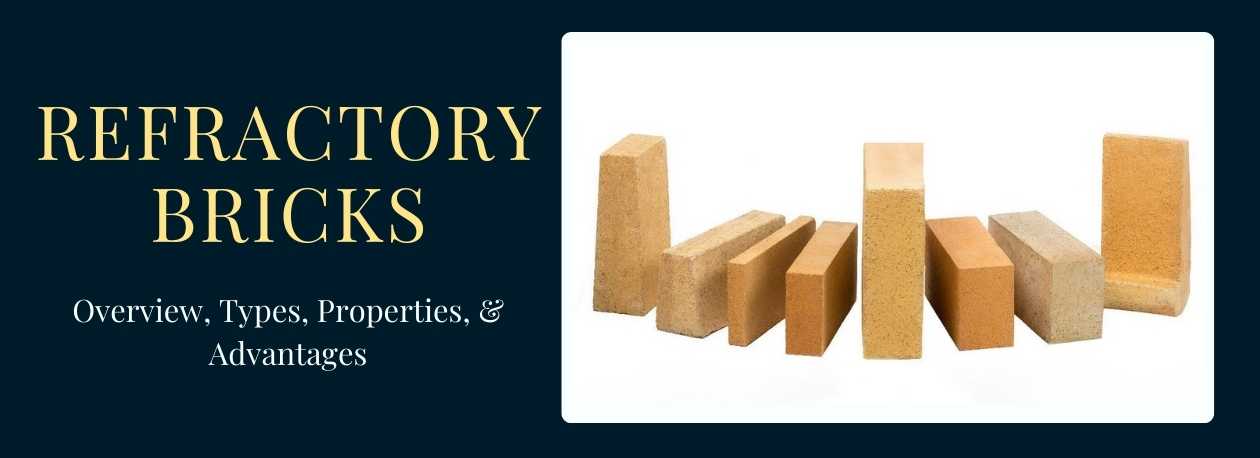
Refractory Bricks: Overview, Types, Properties, and Advantages
A substance with unrivalled resistance to decomposition is called refractory. This substance is resistant to all kinds of chemical assaults and heat, and pressure. However, it still has both strength and form. Refractories are inorganic, polycrystalline, non-metallic, porous, and heterogeneous materials. These materials are oxides, carbides, nitrides, silicon, aluminium, magnesium, calcium, zirconium, and other materials.
Refractory materials are beneficial for fighting physical loads, preventing vessel wall erosion, protecting against corrosion, and providing thermal insulation. They also serve as a solid thermal barrier between the wall of a container vessel and a hot medium.
Refractory Bricks: What are they?
The most crucial building supplies are bricks. Humans have utilized them for countless years. Regular bricks, however, are ineffective for withstanding high temperatures. Here, the top essential refractory brick suppliers in India come into play. Refractory bricks are used in place of regular bricks, which always tend to shatter at high temperatures. These bricks may also go by the titles ceramic bricks or fire bricks.
Quick Characteristics of Refractory Bricks
The primary refractory bricks providers in India provide refractory bricks with the following characteristics, as well as ensure the supply of magnesia bricks in the nation:
- A refractory brick can absorb 5 to 10% of water.
- Refractory bricks are resistant to high temperatures, have a high fusion point, and have exceptional compressive strength.
- Each cubic foot of fire bricks weighs 150 lbs.
- A refractory brick measures 94.52.5 inches or 92.72.25 inches in size.
- Unrivalled chemical resistance is another benefit of refractory bricks.
- They also don't react with the furnace's gases.
Several of the Common Refractory Brick Kinds
- Basic refractory bricks have high corrosion and chemical resistance, as their name implies, and are simple to use.
- Bauxite, Magnetite, and Dolomite bricks are the three types of basic refractory bricks.
- Magnesite bricks are ideal for lining furnaces because they contain 3 to 5% iron oxide and 85% magnesium oxide.
- Dolomite bricks have a higher capacity of withstanding temperatures of 1400 to 1600 degrees.
- Celsius because they contain a lot of calcium carbonate.
Refractory Neutral Bricks
The ideal material for separating the acid and basic lining in the furnace is neutral refractory brick. They are carborundum, forsterite, chromite, and spinal bricks. Magnesite and chromium are also present in significant amounts in neutral refractory bricks.
Acid-Proof Bricks
- They have exceptional strength and fusion points.
- Silica bricks contain 93% silicon dioxide.
- The hardness of these bricks makes them ideal for acid liners in furnaces.
- Acid refractory bricks can resist temperatures of up to 2000 degrees Celsius. India's primary refractory brick suppliers use quartzite or sandstone to make silica bricks.
- Ganister bricks are robust and can endure temperatures up to 2100 degrees Celsius. They also contain 10% clay, 2% lime, and 85% silica.
- Acid refractory bricks are not the best choice for rapid temperature changes. It's because they often break apart.
Benefits of Using Fire or Refractory Bricks
The use of refractory bricks has a lot of benefits. They are more expensive than traditional bricks due to their exceptional high-end insulating power. For your further investments, they do offer some unique gifts.
The primary refractory fire brick manufacturers in India that also oversee the nation's supply of magnesia bricks provide refractory bricks with the following benefits.
1. Outstanding Insulation: Fire bricks are mainly used for their excellent insulating properties. They can prevent heat from passing through them. They also maintain the building's comfort in summer and winter.
2. Superior Strength Bricks: Refractory bricks are more durable than regular bricks. They are hence more resilient than traditional bricks. They are also relatively light.
3. Any Size and Shape: Refractory bricks that can be customized are provided by the fundamental refractory fire brick manufacturers in India, who also guarantee the supply of magnesia bricks in the nation. Most producers and suppliers offer customers personalized bricks in specified shapes and dimensions.
Conclusion:
With a production capacity of more than 5000 bricks per day, Refmon Industries is one of India's top producers of fireproof, boiler, furnace, and refractory fire bricks. Refmon produces a variety of refractory shapes and products, including burner blocks, slabs, rings, high alumina bricks, refractory bed material, and refractory bricks of different grades and sizes. They provide a complete engineering service that enables you to get the best results with the least hassle. You can adjust the energy consumption and current performance with refractory lining in furnaces. Refmon Industries is undoubtedly an option for you if you're looking for reliable refractory bed material suppliers. At your convenience, they offer outstanding refractory solutions for all your refractory work. You won't find this type of cutting-edge furnace lining material anywhere else.